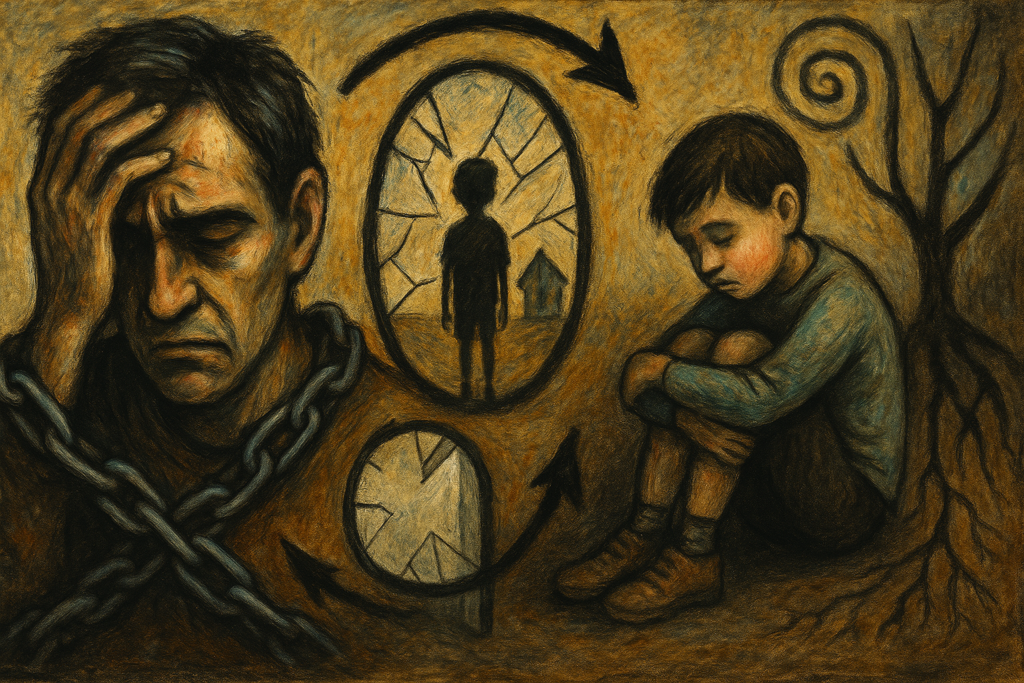READ IT TO ME: Click play to listen to this post.
For sure, nobody gets through childhood unscathed. Some of us experience “Big T” traumas while others experience “Small T” traumas. There is always baggage each of us carries from childhood. We rinse and repeat, re-live patterns, dynamics, and emotional states that were connected to earlier traumatic experiences.
I experienced complex trauma as a young boy growing up that triggered re-enactment throughout much of my adult life. There were core shame beliefs unintentionally passed on from my mother and father from their toxic family upbringing. I was the youngest of 5 boys. There was physical and emotional abuse from all of my older brothers. There was sexual and religious abuse from the church (cult) I grew up in. There was underlying covert racism that influenced my upbringing. Each of these complex traumas greatly impacted my behavior, inner experience, and adult relationships.
Trauma triggers reenactment. Being on the younger side of 9 kids in a family that raised 12 kids (parents raised oldest sister’s 3 kids) set the stage for feeling overwhelmed. Just explaining my childhood narrative alone felt overwhelming! I witnessed bloodfest fighting by and on one of my older brothers, shaming and sabotaging my success in sports by the same brother, smothering and dangling from a second-floor bedroom window by my legs by another, and just a deep sense of feeling all alone growing up. There was sexual abuse from a childhood pastor and a theology of doom and gloom that promised fire and brimstone if you were guilty of sin at the second coming of Christ. It all seemed so overwhelming!
My early adulthood was marred with one failure after another. I was told by one of my high school teachers who rigged a poll identifying me as the least likely to go to college. With that, I was a failure. My advisor in college told me that I would never be more than a 9 to 5’er every time I met with him! I never scored higher than a 2.0 GPA in high school or college. It felt like I experienced one failure after another. I truly lived an overwhelmed life. Every experience I set up for work or fun had the element of overwhelm and impossibility. I had just learned to live that way. Subconsciously, I sought out the overwhelming difficult scenario, believing that was my deserved destiny.
Looking back, I identified with key figures that played out what I experienced as a kid growing up—never able to please or be enough! There were basketball coaches who I was convinced were disappointed in me. I thought I was an embarrassment to my football coach—after all, we went 0 and 9, losing all of our games!
Lacking awareness, I sought out key authority figures in a subconscious attempt to attain their smile of approval—one that I had never gotten approval from in all of my life!
I have since learned that there are key authoritative figures who consciously or subconsciously looked for guys who were emotionally needy just like me!
During my early adulthood, I inadvertently recreated familiar painful scenarios in working relationships that mirrored my early traumatic environment. I didn’t know it then but I tried to earn the love and respect that was missing in my childhood. These scenarios triggered shame and abandonment. It felt like rinse and repeat.
It was an unconscious effort to resolve and integrate unaddressed trauma. It only perpetuated more suffering, confusion, and further trauma in my life. This is called re-enactment and involves trauma repetition. Does any of this sound familiar?
Fritz Perls, father of Gestalt therapy, once said that nothing changes until it’s real. This is the first step toward healing and in the next blog, I will address how many have successfully addressed overcoming re-enactment of trauma and trauma repetition.
Here are a few questions to reflect upon that might help you clarify your own trauma re-enactment:
1. Can you identify situations or relationships in your adult life that feel emotionally similar to painful experiences from your childhood?
2. Are there people or dynamics you feel drawn to repeatedly, even though they cause you distress? Journal about them or share them with a close friend.
3. What childhood roles (e.g., hero, scapegoat, lost child, caretaker) did you take on, and how might you still be living out these roles today.
4. How have your survival strategies as a child helped you? How might they now be keeping you stuck in harmful patterns?





